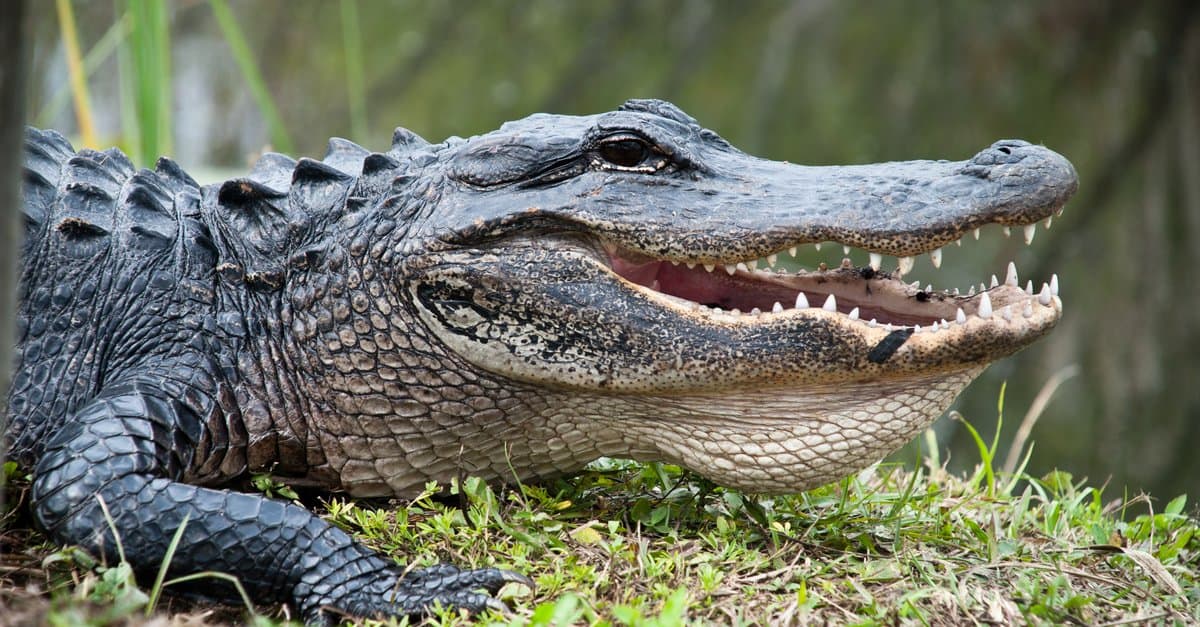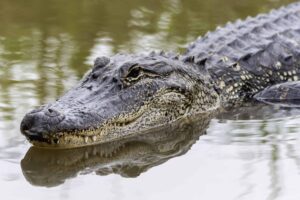Alligators are cold-blooded reptiles that live mainly in wetland areas. With large jaws, sharp claws, and scaly skin, alligators can be a scary sight. Their speed, strength, and general bloodthirstiness are what continue to fascinate people all around the world. As such a ferocious predator, alligators have been able to survive and build quite a reputation for themselves for the past millions of years. As an ancient species, let’s discover just how old the world’s oldest living alligator is.
All About Alligators
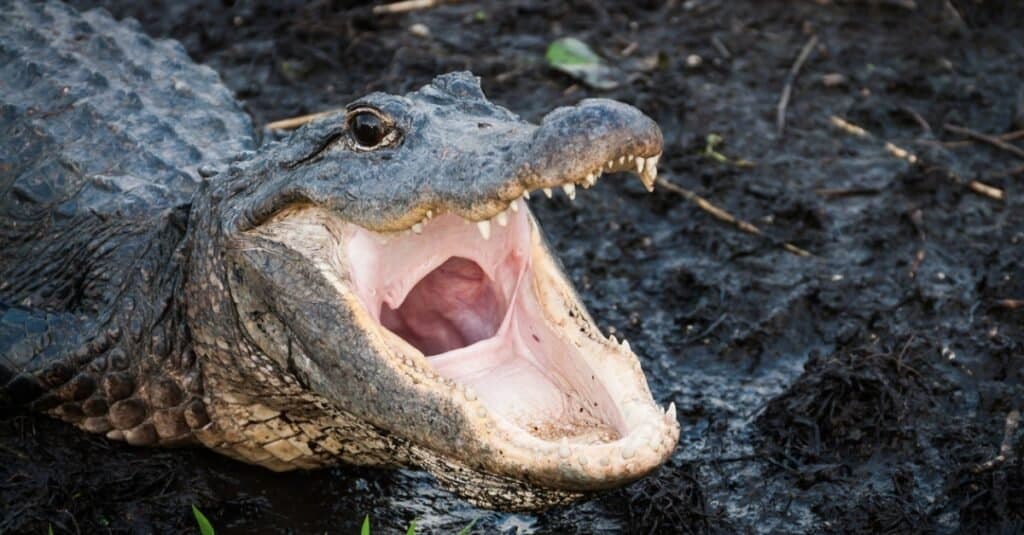
The oldest alligator on record is Muja, who is 85 years old.
©iStock.com/unclegene
Alligators are reptiles and members of the crocodilian family, which includes American alligators, Chinese alligators, crocodiles, and caimans. The American Alligator (Alligator mississippiensis) is the largest reptile in North America and is found in the wetlands of the southeastern states. When traveling around Florida or Louisiana, alligators are a common sight for both locals and tourists. Chinese alligators can be found in the Yangtze River valley in China.
Unlike many other animal species on Earth, alligators have undergone little evolutionary change. As a prehistoric species, their ancestors first evolved more than 245 million years ago, making them the most closely related reptile to dinosaurs. The modern crocodile family itself emerged late in the reign of dinosaurs during the Cretaceous Period. However, unlike the dinosaurs, alligators managed to avoid extinction more than 65 million years ago.
As apex predators, adult alligators eat a diet of fish, turtles, snakes, and other small mammals while younger alligators will indulge in bugs, amphibians, and smaller fish. Although they’re carnivores, they’re also not opposed to eating fruits and a hungry alligator will eat whatever it can sink its teeth into.
Alligators have around 70 to 80 teeth in their jaws throughout their life, however, they do eventually break or tear thanks to their powerfully crushing jaw. Fortunately, they are able to regrow their teeth and the average alligator will go through 3,000 or more teeth throughout their life. Gators have among the strongest bite forces on the planet, with a measured force of around 2125 pounds per square inch.
How Long Can Alligators Live?
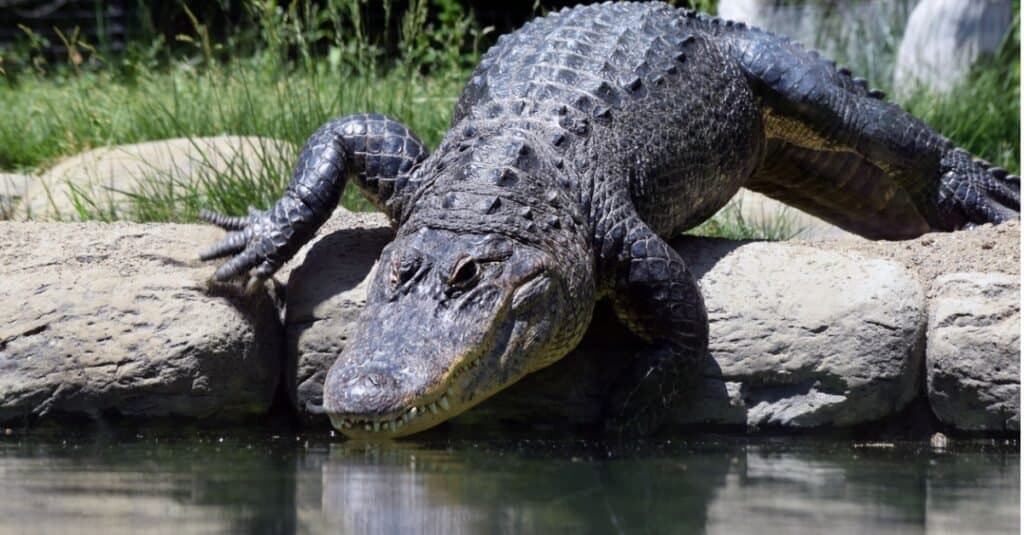
Alligators have a typical lifespan of 30-50 years old.
©iStock.com/Bradley Proxmire
Unlike many other animals on this planet, crocodiles and alligators have no finite life span. Instead, they continue to live and grow unless affected by their environment through a lack of food, disease, accidents, or another large predator. Instead of aging biologically, alligators continue to simply grow in size. Negligible senescence is the term used for these organisms that do not exhibit the signs of biological aging. It has even been coined as being ‘biologically immortal’. Alligators and crocodiles aren’t the only vertebrates to display ‘biological immortality’ as flounders, Rougheye rockfish, and even a few tortoises have been observed to not age biologically.
While alligators can’t die from old age, they also don’t live forever. The average lifespan of a wild American alligator is between 30-50 years with the Chinese alligator also averaging around 50 years in the wild. As they continue to age, gators find it harder to hunt as they begin to need more food to survive due to their large size. After a certain point, they are no longer able to feed themselves enough to sustain their metabolism and will then pass away from starvation.
The World’s Oldest Living Alligator
The world’s oldest alligator is at least 85 years and named Muja.
Muja is an American alligator at Belgrade Zoo in Serbia. While his exact hatch-year isn’t truly known, Muja first arrived at the Belgrade Zoo in 1937, when he was already two years old at the time. In 2018, Guinness World Records recorded Muja as the “Oldest living alligator in captivity” stating that, “as of 22 May 2018 he was at least 80 years 252 days.” That means as of 2021, Muja would be at least 85 years old!
Muja has had an interesting past. During World War 2, bombing of Belgrade destroyed most the zoo he lived in, yet Muja managed to survive and continue growing old.
With consistent care and food, Muja has continued to stay healthy. His only health issue occurred back in 2012 when he contracted gangrene. However, he underwent successful surgery to amputate his front right claw and has fully recovered ever since. Muja is the only remaining animal from the zoo’s earliest days and even survived another bombing campaign in 1999. His resilience has made him a favorite amongst visitors to the zoo.
Are Alligators Dangerous?
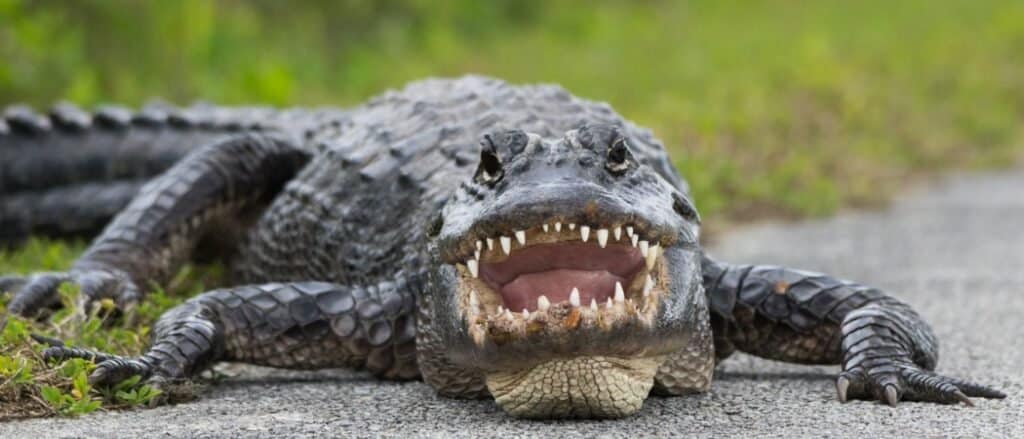
Alligators are attracted to motion and movement.
©iStock.com/tobiasfrei
Alligators are not particularly dangerous and while alligator attacks are rare, they still pose a risk to humans. While gators don’t typically see people as food, they are attracted to motion and movement. Most will not attack humans unless you come into close contact with one or approach their territory. Around 4% of alligator attacks on humans in the United States have resulted in death, a majority of which occurred in Florida according to the Florida Museum International Shark Attack File.
To stay safe, never feed an alligator, keep a safe distance or avoid areas where they inhabit, keep pets away from water, and only swim in designated areas during daylight.
Are Alligators Under Threat?
Today, American alligators are no longer considered to be an endangered species and are a conservation success story. American alligators were once threatened by extinction due to the large amount of gator hunting that went on through the 1800s all the way to the mid-1900s. Alligators were largely being hunted for their skin, as it was used to make leather, as well as being poached for their meat. This fatal mixture of poaching along with a loss of their natural habitat led them to the brink of extinction.
In 1967, alligators were officially listed as endangered species. Thanks to both state and federal conservation efforts, The Endangered Species Act of 1973 was put in place and prohibited the ongoing hunting of alligators. Thanks to these efforts, the alligator population was able to rebound with a wild population of nearly one million alligators.
Thank you for reading! Have some feedback for us? Contact the AZ Animals editorial team.

